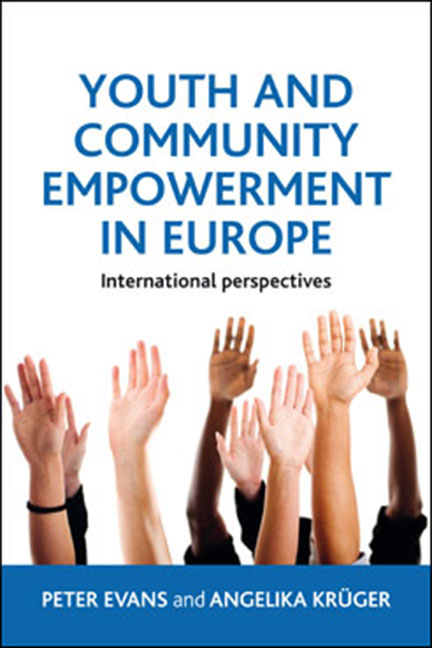Book contents
- Frontmatter
- Dedication
- Contents
- List of figures and tables
- List of abbreviations
- Acknowledgements
- Preface
- Background to the Youth Empowerment Partnership Programme
- one Introduction: the theoretical context of the YEPP approach
- two YEPP I: implementation
- three YEPP I: key changes in YEPP Local Programme Sites
- four YEPP I: meeting the goals
- five YEPP II: learning from YEPP I
- six YEPP II: portraits and overall programme outcomes
- seven YEPP I and II: conclusions and policy implications
- Epilogue: The future of YEPP
- References
- Index
three - YEPP I: key changes in YEPP Local Programme Sites
Published online by Cambridge University Press: 07 September 2022
- Frontmatter
- Dedication
- Contents
- List of figures and tables
- List of abbreviations
- Acknowledgements
- Preface
- Background to the Youth Empowerment Partnership Programme
- one Introduction: the theoretical context of the YEPP approach
- two YEPP I: implementation
- three YEPP I: key changes in YEPP Local Programme Sites
- four YEPP I: meeting the goals
- five YEPP II: learning from YEPP I
- six YEPP II: portraits and overall programme outcomes
- seven YEPP I and II: conclusions and policy implications
- Epilogue: The future of YEPP
- References
- Index
Summary
This chapter provides summaries of the key changes that took place in the YEPP Local Programme Sites based on data provided in both the internal and external evaluation reports. The first to be described are those sites where YEPP was well implemented: Tuzla-Simin Han in Bosnia and Herzegovina, Turin-Mirafiori in Italy and Kristinestad in Finland. Next are those where there was only partial implementation: Turin-Parella in Italy; Antwerp North in Belgium and Mannheim Neckarstadt-West in Germany. Dublin North East Inner City in Ireland is the last Local Programme Site to be presented, since it became part of YEPP much later in the development of the work. These summaries are all structured in the same way. The sections describing the method used to create change are divided into goals, means and results within the different action research-based cycles of change. They are presented in this way in order to highlight the links between intention (goals), the means used to create change and the results, and in order to emphasise the causal links.
As far as possible all of these skeletal reports are structured in the same way. They are based on much fuller reports covering some 600 pages.
Well-implemented sites
Tuzla-Simin Han, Bosnia and Herzegovina
Background
Simin Han is a semi-rural district on the outskirts of the city of Tuzla in Bosnia and Herzegovina. Simin Han has been deeply affected by the war in the Balkans during the 1990s and by the move from communism to capitalism. After many demographic changes following the war, the population of Simin Han in 2006 was around 7,000–8,000, with a prewar-domiciled to post-war refugee ratio of about 1:2. This must be contrasted to a ratio of approximately 1: 6 that obtained in 2002, nearer to the start of YEPP in Simin Han.
Economic recovery has been very slow, with little investment in recent years. This means that the unemployment rate is high, estimated to be between 50% and 70%. Furthermore, following the Dayton Peace Agreement after the war (Dayton Peace Agreement on Bosnia and Herzegovina, 1995), political organisation has changed, with many of the decision-making powers having moved from the municipal to the cantonal level.
As a result, on the one hand, there is a lack of social cohesion and community identity, and poor public and community infrastructure, while on the other hand, local participants are interested in long-term community and youth empowerment.
- Type
- Chapter
- Information
- Youth and Community Empowerment in EuropeInternational Perspectives, pp. 19 - 82Publisher: Bristol University PressPrint publication year: 2012



